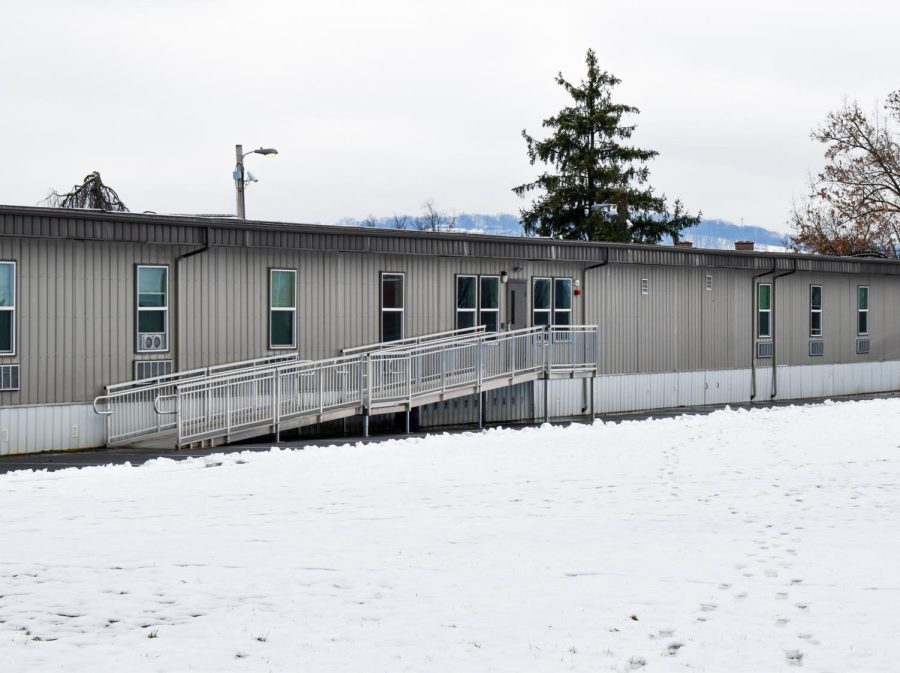Mold isn’t the only thing growing in March Hall modular housing. The dormitory commonly referred to as “the mods” has continuously been threatened by the presence of black mold, and frustration has long been mounting.
“The problem with the mold and the mods is that it felt like it was everywhere,” Jorge Yoshiyama ‘24 said. “You would just walk into the mods and then instantly your nose would start stuffing up.”
Yoshiyama attributed much of the mold issue to the air conditioning units.
“[It caused] most of the mold problem,” Yoshiyama said. “Cleaning them out was not fun. The screen that you would take out that filtered out the lint and whatnot, it’d be linty, but it’d also be like black, dirty.”
Casey Wong ‘24, who lived in the mods with Yoshiyama last year, said that he reached out to facilities workers but noted that their efforts proved largely ineffective.
“The school did not clean them,” Wong said. “They were like, ‘Oh, it’s just dirt’. They had someone come clean off the A.C.’s and then it just grew back. They didn’t do anything to help us out after that.”
Director of Facilities Scott Kennedy wrote in an email that all reports of mold are diligently examined.
“Every report of mold is forwarded to the Environmental, Health and Safety office so a thorough inspection can be completed to determine the cause and corrective action,” Kennedy wrote.
All forms of mold have the potential to cause unpleasant symptoms. Those most vulnerable, however, are those who are specifically allergic and those who are exposed to mold for prolonged periods.
“The sniffling and the congestion went on for a while,” Yoshiyama said. “I thought it was an allergy or something, but I realized it was definitely the room because when I went back home all the sniffling stopped pretty quickly.”
The problem does not seem to be getting resolved soon. George Shegog ‘25, who currently lives in the mods, decided to conduct a mold test with his friends on their air conditioning unit.
“We got one of those take-home testing kits and it came back covered in mold,” Shegog said. “[My friends] asked the facilities people to come check it out and when they did, they told my friend that it was normal for an A.C. to have some mold show up on tests and they never really did anything about it.”
A current sophomore resident of the mods, who wished to remain anonymous, said that he thinks that the dorm’s status as a temporary residence hall could be contributing to this prolonged issue.
“It feels like the school’s always kept the mods on the down low anyway,” he said. “It’s not a very nice building compared to, say, South or Marquis. So, I guess that general lack of attention probably feeds into the issues we’ve had with mold.”
Kennedy wrote that Facilities is unaware of any unsafe mold issues in the mods.
“There is no reason to believe the mods are unsafe,” Kennedy wrote. “Regular cleaning and maintenance help prevent mold growth and checks of the building have not identified any building-wide issues.”
Despite these challenges they’ve faced, most students seem quite happy living in the mods. Outside of the mold crisis, Yoshiyama looks back on his time there fondly.
“The thing about that place was that we were all so on top of each other all the time that it brought us all really close together,” he said. “We were such a tightly knit group, and I don’t think it’s really like that in a lot of the other dorms on campus.”
This tightly knit group even found a more lighthearted way to deal with the mold themselves. Left to their own devices, one resident saw an opportunity to be seized.
“One of the guys cleaned their A.C out,” Yoshiyama said. “Soon enough he was straight up offering to clean anyone else’s for five bucks. A lot of people took him up on the offer.”


























































































































